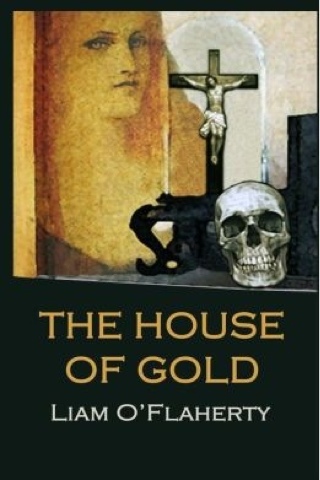
 The Irish Censorship of Publications Board was established in 1929 by the newly-formed Irish Free State (boy, isn’t that a contradiction in terms) to examine and restrict ‘obscene’ publications. Liam O’Flaherty’s The House of Gold had coincidentally been released that same year and enjoyed a brief time in print before becoming the first novel to succumb to the censors’ will in 1930 for allegedly being indecent- greed, priestly lust, alcoholism, sexual frustration, and murder are among the themes in the novel.
The Irish Censorship of Publications Board was established in 1929 by the newly-formed Irish Free State (boy, isn’t that a contradiction in terms) to examine and restrict ‘obscene’ publications. Liam O’Flaherty’s The House of Gold had coincidentally been released that same year and enjoyed a brief time in print before becoming the first novel to succumb to the censors’ will in 1930 for allegedly being indecent- greed, priestly lust, alcoholism, sexual frustration, and murder are among the themes in the novel.
Many of the authors whose novels were banned during this period, such as Aldous Huxley, had their work restored upon later appeals or the censorship orders have long-since expired. However, the 2013 release of The House of Gold will mark the first time this book has been freely available in Ireland in more than 83 years.
It expressed O’Flaherty’s disillusionment with a post-revolution Ireland and the new order of the Catholic Church. Set in the fictional town of Barra, recognizable as Galway, the novel charts how the old order was replaced in the emerging Free State by an “oppressive native gombeen ascendancy, buttressed by the Catholic church” according to the new introduction by novelist, poet, and journalist Tomás Mac Síomóin.
O’Flaherty subscribed fully to the Marxist view that religion was “the opiate of the people” and served to keep the “peasants” submissive. It’s not too difficult to see why much of the novel can be seen as an attack on the role of the Catholic priest as a tool of the wealthy to control the masses- one of the elements in the novel that caused the most outrage on the censorship board was the depiction of a priest lusting after a married woman.
O’Flaherty may have had his reputation also partly responsible for being put on the list.
He had been stationed on the Western Front during World War I and was subsequently injured. It’s possible that the shell shock he suffered may have been responsible for the mental illness which became obvious in 1933 when he suffered from the first of two mental breakdowns.
Having already become interested in Karl Marx in school,he returned from the war as a socialist and two days after the establishment of the Irish Free State in 1922 O’Flaherty and a group of supporters seized a building in Dublin for four days, flying a red flag from it.
O’Flaherty eventually left Ireland and moved to the United States, where he lived in Hollywood for a short time and where famed director John Ford, a cousin, turned O’Flaherty’s novel, The Informer, into a film. Later in life he travelled the United States and Europe; the letters he wrote (more than 450) while travelling have now been published. Before his death he left the Communist Party and even returned to the Roman Catholic faith.
 O’Flaherty died on September 7, 1984, in Dublin. Many of his works have since been republished and he is remembered today as a powerful writer and a strong voice in Irish culture. In 2006 a memorial garden was built in his native village of Gort na gCapall, with a plaque describing his life and writings.
O’Flaherty died on September 7, 1984, in Dublin. Many of his works have since been republished and he is remembered today as a powerful writer and a strong voice in Irish culture. In 2006 a memorial garden was built in his native village of Gort na gCapall, with a plaque describing his life and writings.
It seems appropriate that the novel was formally relaunched at the Galway City Library on June 13.
Incidentally, although none of those original titles from 1930 remain officially on the list under the old obscenity laws, technically many of them remain banned for various other reasons. Several books are still restricted for discussing abortion and pornographic magazines, including Hustler, continue to be banned.
Others that remain “technically” banned are mid-twentieth-century crime magazines that have long since ceased publication and are out of print. The UK version of the News of the World, for example, was under such a technical ban when it ceased publication in 2011.
For more information on the Banned Books Awareness and Reading for Knowledge project and the complete list of titles covered, please visit the official website at http://bbark.deepforestproductions.com/
Sources: Newstalk, Wikipedia, Irish Times
© 2013 R. Wolf Baldassarro/Deep Forest Productions

Great post, keep up with the hard work, you